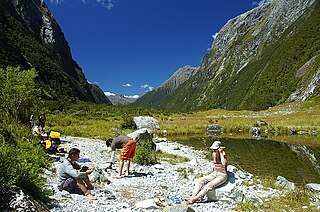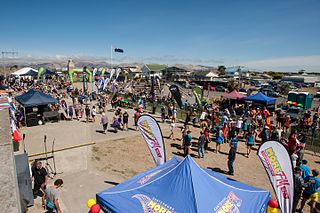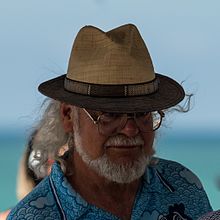
Queenstown is a resort town in Otago in the south-west of New Zealand's South Island. It is the seat and largest town in the Queenstown-Lakes District.

Lake Wānaka is New Zealand's fourth-largest lake and the seat of the town of Wānaka in the Otago region. The lake is 278 meters above sea level, covers 192 km2 (74 sq mi), and is more than 300 m (980 ft) deep.

Wānaka is a popular ski and summer resort town in the Otago region of the South Island of New Zealand. At the southern end of Lake Wānaka, it is at the start of the Clutha River and is the gateway to Mount Aspiring National Park.

The Milford Track is a hiking route in New Zealand, located amidst mountains and temperate rain forest in Fiordland National Park in the southwest of the South Island. The 53.5 km (33.2 mi) hike starts at Glade Wharf at the head of Lake Te Anau and finishes in Milford Sound at Sandfly Point, traversing rainforests, wetlands, and an alpine pass.
The Alpine Ironman was first held on 21 October 1980 in New Zealand. It was a three-day race featuring skiing, trail running and kayaking. The idea for the event came from Robin Judkins, who became the race's director, and his friend and business partner Peter Tocker; they were running Motatapu Canoes in Wānaka. Judkins was skiing with the general manager of Radio Otago and asked for a job as a radio announcer. A few days later, Judkins was asked to do a voice test by talking about his idea for the Alpine Ironman. He made up a story as he went along, including that Peter Hillary would be competing, and that the first prize would be a trip around the world. When the radio station told him that they wanted to broadcast this recording, Judkins was dumbfounded: "You're joking." They didn't, and Judkins went to Christchurch to find a sponsor, and organised the event within five weeks.
John Howard is considered the central pioneer of adventure racing.
Macpac is a brand specialising in outdoor recreational equipment. It is best known for camping and travel equipment including backpacks, sleeping bags and technical clothing. Macpac was originally a New Zealand company but is now owned by the Australian company Super Retail Group. Macpac was founded by Bruce McIntyre in 1973.

The Coast to Coast is a non-standard multisport competition held annually in New Zealand. It is run from the west coast to the east coast of the South Island, and features running, cycling and kayaking elements over a total of 243 kilometres (151 mi). It starts in Kumara Beach and traditionally finished in the Christchurch suburb of Sumner, but since 2015 finishes in New Brighton. The event was created in 1983 by Christchurch personality Robin Judkins, who sold the rights to Queenstown-based tourism company Trojan Holdings in 2013. Richard Ussher took over from Judkins as race director in 2015. In 2019, Glen Currie was contracted to continue on from Richard Ussher in the role of race director.

Snow Farm is a ski area near Wānaka, New Zealand, dedicated to cross-country skiing.

Stephen Bruce Gurney is a New Zealand multisport and triathlon athlete. He has won the Coast to Coast race a record nine times.
Robert James "Bob" McKerrow, a native of New Zealand, is a humanitarian, mountaineer, polar traveller, writer and poet. He currently works as Country Coordinator for the Swiss Red Cross in the Philippines working on the Typhoon Haiyan (Yolanda) operation. When the Indian Ocean tsunami struck on 26 December 2004, McKerrow worked in India, Sri Lanka, Maldives and Indonesia, coordinating Red Cross programmes for people affected by the tsunami for an eight-year period.

Richard Arland Ussher is a New Zealand multisport athlete. He has represented his country at the 1998 Winter Olympics and is a five-time winner of the Coast to Coast multisport race, and formerly held the New Zealand Ironman-distance Triathlon record at 8hr 2min 15sec. From 2015-18, he was the race director for the Coast to Coast.
Winter Games NZ (WGNZ) is the largest snow sports event in the Southern Hemisphere and is held annually in the Southern Lakes District, at Queenstown and Wānaka Ski Areas.

Craig Robert Adair is a New Zealand track cyclist.

Sir Graeme Dingle is a New Zealand outdoor adventurer and mountaineer, who founded the Graeme Dingle Foundation. He is also known for his writing and humanitarianism.
Brian Robert Ford is a former New Zealand rugby union player. A wing, Ford represented Canterbury and Marlborough at a provincial level, and was a member of the New Zealand national side, the All Blacks, from 1977 to 1979. He played 20 matches for the All Blacks including four internationals. In 1988, he was one of the first two "celebrity entries"—alongside Kevin Eveleigh—at the annual Coast to Coast adventure race.
Kevin Alfred Eveleigh is a former New Zealand rugby union player. A flanker, Eveleigh represented Manawatu and Bay of Plenty at a provincial level, and was a member of the New Zealand national side, the All Blacks, from 1974 to 1977. He played 30 matches for the All Blacks including four internationals. He later captained Rhodesia between 1979 and 1980, and was the coach of Manawatu in 1987. In 1988, he was one of the first two "celebrity entries"—alongside Brian Ford—at the annual Coast to Coast adventure race.
Kathleen Lynch is a retired competitive cyclist from New Zealand who competed both on and off the road. With a talent for multiple sports disciplines, she won the canoeing events New Zealand White Water Downriver and Slalom Championships in 1987 and represented her country at the 1988 Canoe Slalom World Cup. Around the same time, she was also a successful triathlete, but did not continue with that sport. She bought her first mountain bike in 1988 at the age of 31 in order to compete in an adventure sport event, and within a year she had become the New Zealand national cross country champion. Around the same time, she also took up road cycling. She was included in the New Zealand team for the 1990 Commonwealth Games and was assigned as domestique for the top New Zealand road rider, Madonna Harris. Harris and Lynch finished in fourth and ninth places respectively. In September 1990, Lynch competed at the inaugural UCI Mountain Bike World Championships and finished tenth. In November 1990, she became a household name in New Zealand by winning a 22-day multi-sport race the length of the country that had prime time TV coverage every night.
John Jacoby is an Australian adventure racer. In the mid-1980s, he dominated the world in canoe marathon, winning three successive world cup canoe marathons before becoming the inaugural ICF canoe marathon world champion at the 1988 event in Nottingham, United Kingdom. After the 1988 World Championship, he retired from International Canoe Federation (ICF) events and concentrated on adventure racing.

Sir John Stratton Davies is a New Zealand businessman and a former mayor of Queenstown. Through Trojan Holdings Ltd, he is a major owner of South Island tourism companies.












